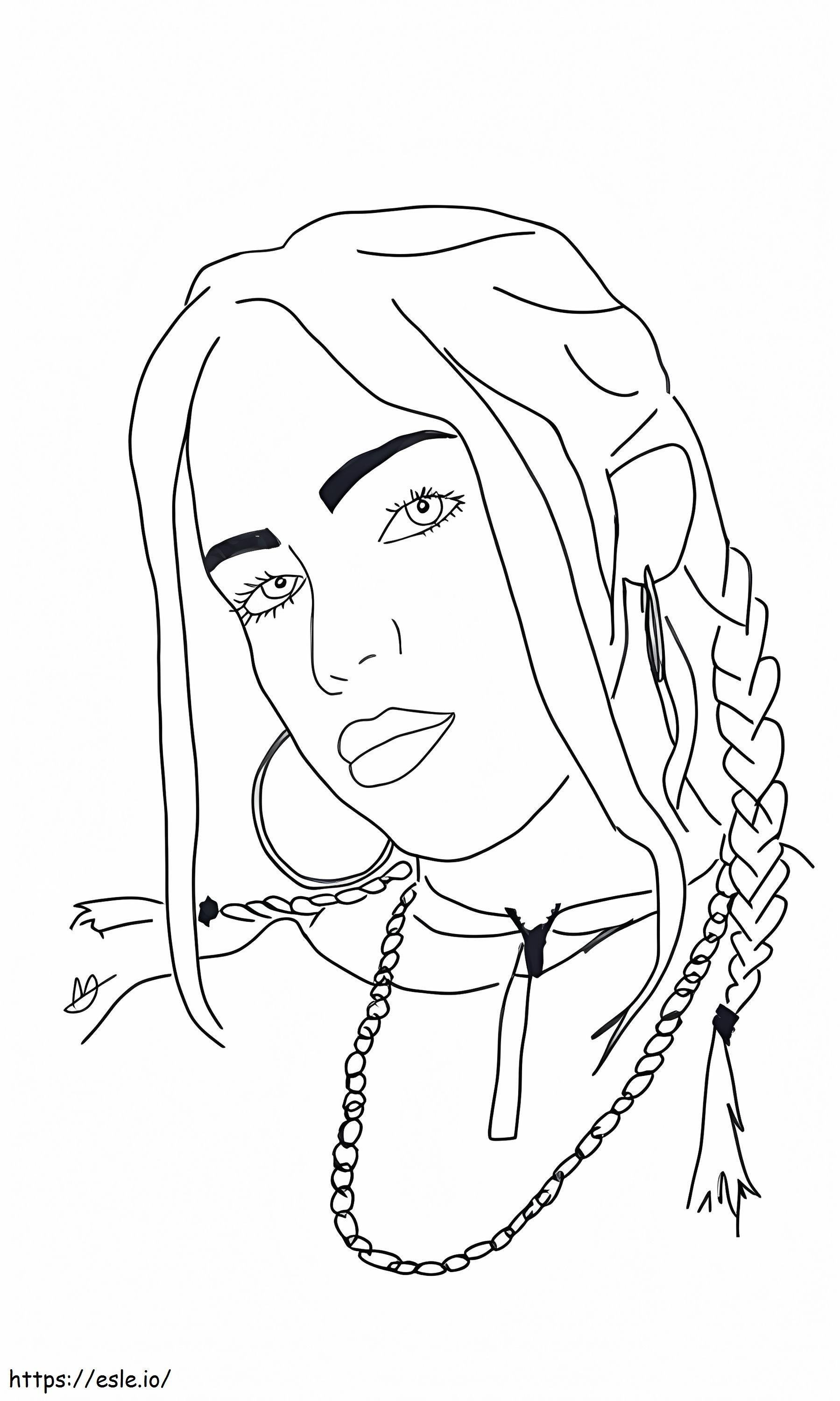Billie Eilish Rul 34 has become a trending topic among fans and internet users alike, sparking curiosity and debates across social media platforms. As one of the most influential pop icons of her generation, Billie Eilish's name being associated with Rule 34 has raised eyebrows and drawn attention to the darker side of internet culture. Rule 34, a well-known internet adage, suggests that if something exists, there is likely explicit content related to it. This article delves into the origins, implications, and controversies surrounding Billie Eilish and Rule 34, offering an in-depth analysis for readers seeking clarity and understanding.
In today’s digital age, internet culture has become a double-edged sword, blending creativity with controversy. While platforms like TikTok, Instagram, and Twitter have allowed artists like Billie Eilish to reach global audiences, they have also exposed them to the darker corners of the web. Rule 34, often discussed in online forums, is one such phenomenon that intersects fandom, creativity, and ethical concerns. Understanding this topic requires a balanced approach, acknowledging both the freedom of expression and the potential harm it may cause to individuals.
This article will explore the origins of Rule 34, its application to public figures like Billie Eilish, and the broader implications for online communities. By examining credible sources, expert opinions, and real-world examples, we aim to provide a comprehensive guide that educates readers while adhering to ethical standards. Whether you're a fan of Billie Eilish, a curious internet user, or someone concerned about digital ethics, this article will equip you with the knowledge to navigate this complex topic responsibly.
Read also:Unblocked Games 66 Ultimate Guide To Enjoy Gaming Anytime Anywhere
Table of Contents
- What is Rule 34?
- Billie Eilish Biography
- The Impact of Rule 34 on Celebrities
- Ethical Concerns and Legal Implications
- Fan Culture and Internet Trends
- Protecting Artists in the Digital Age
- Statistics and Data
- Expert Opinions
- How to Navigate Online Content Responsibly
- Conclusion
What is Rule 34?
Rule 34 is a widely recognized internet meme and adage that states, "If it exists, there is porn of it. No exceptions." This rule highlights the vast and often unregulated nature of internet content, where virtually any topic, person, or concept can become the subject of explicit material. The origins of Rule 34 can be traced back to early internet forums and communities, where users began to notice the pervasive creation of adult content based on popular culture, fictional characters, and even inanimate objects.
The rule gained traction in the mid-2000s, particularly within online subcultures like 4chan and Reddit. It became a tongue-in-cheek commentary on the boundless creativity and, at times, the darker aspects of internet culture. While Rule 34 is often discussed humorously, it also raises serious questions about consent, privacy, and the ethical implications of creating and sharing explicit content without the subject's permission.
How Rule 34 Affects Public Figures
For celebrities like Billie Eilish, Rule 34 poses unique challenges. Public figures are often subjected to unwanted attention, and the creation of explicit content featuring them can exacerbate issues of privacy invasion and emotional distress. This phenomenon highlights the need for stricter regulations and greater awareness about the impact of such content on individuals' mental health and reputations.
Billie Eilish Biography
Billie Eilish Pirate Baird O'Connell, known professionally as Billie Eilish, is an American singer-songwriter who has captivated audiences worldwide with her unique voice and genre-defying music. Born on December 18, 2001, in Los Angeles, California, Billie grew up in a family of musicians and began writing songs at a young age. Her breakthrough came in 2015 with the release of "Ocean Eyes," a hauntingly beautiful track that went viral on SoundCloud.
Billie Eilish's Personal Information
| Full Name | Billie Eilish Pirate Baird O'Connell |
|---|---|
| Date of Birth | December 18, 2001 |
| Place of Birth | Los Angeles, California, USA |
| Occupation | Singer, Songwriter |
| Notable Achievements | 7 Grammy Awards, 2 American Music Awards |
Her Rise to Fame
Billie Eilish's rise to fame is a testament to her artistic talent and the power of digital platforms. Collaborating with her brother Finneas O'Connell, who produces much of her music, Billie has released chart-topping albums like "When We All Fall Asleep, Where Do We Go?" and "Happier Than Ever." Her music often explores themes of mental health, self-identity, and societal pressures, resonating deeply with Gen Z and millennial audiences.
The Impact of Rule 34 on Celebrities
For celebrities, being targeted by Rule 34 can have profound psychological and professional consequences. The unauthorized creation and distribution of explicit content not only violate their privacy but also perpetuate harmful stereotypes and objectification. In Billie Eilish's case, her young age and status as a role model for millions of fans make the issue particularly concerning.
Read also:Exploring The Life And Achievements Of Marchela Francesca Hetfield
Psychological Effects on Artists
- Increased anxiety and stress due to privacy invasion.
- Strained relationships with fans and the public.
- Potential damage to professional reputation and career opportunities.
Case Studies of Other Celebrities
Other celebrities, such as Taylor Swift and Ariana Grande, have also faced similar challenges. These instances underscore the urgent need for better legal protections and public awareness campaigns to combat the negative effects of Rule 34 on public figures.
Ethical Concerns and Legal Implications
The intersection of Rule 34 and celebrity culture raises significant ethical and legal questions. Creating and sharing explicit content without consent violates fundamental principles of privacy and autonomy. In many jurisdictions, such actions may also constitute harassment or defamation, leading to potential legal consequences for perpetrators.
Legal Protections for Celebrities
- Right to privacy laws.
- Anti-harassment and cyberbullying legislation.
- Intellectual property rights to control the use of one's likeness.
Challenges in Enforcement
Despite existing laws, enforcing protections for celebrities remains challenging. The anonymity of the internet and the global nature of online platforms often hinder efforts to hold individuals accountable. Collaborative efforts between governments, tech companies, and advocacy groups are essential to address these gaps.
Fan Culture and Internet Trends
Fan culture plays a significant role in shaping internet trends, including the proliferation of Rule 34 content. While fandom can be a source of creativity and community, it can also lead to harmful behaviors when boundaries are crossed. Understanding the dynamics of fan culture is crucial to addressing the root causes of Rule 34 and promoting healthier online interactions.
Positive Aspects of Fan Culture
- Support for artists through fan art and fan fiction.
- Building communities around shared interests.
- Amplifying positive messages and causes.
Negative Aspects of Fan Culture
- Obsessive behaviors and lack of boundaries.
- Creation of harmful or exploitative content.
- Spreading misinformation or rumors.
Protecting Artists in the Digital Age
In an era dominated by digital media, protecting artists like Billie Eilish requires a multi-faceted approach. This includes strengthening legal frameworks, promoting digital literacy, and fostering a culture of respect and consent online.
Steps to Protect Artists
- Advocating for stricter regulations on content platforms.
- Educating users about the importance of consent and privacy.
- Encouraging platforms to implement robust content moderation policies.
Role of Social Media Platforms
Social media platforms have a responsibility to safeguard their users, particularly public figures who are vulnerable to exploitation. By investing in advanced moderation tools and collaborating with legal experts, platforms can create safer online environments for everyone.
Statistics and Data
Understanding the scope of Rule 34 and its impact requires examining relevant statistics and data. According to a 2022 report by the Cyber Civil Rights Initiative, 92% of non-consensual pornography victims reported significant emotional distress. Additionally, a survey conducted by the Pew Research Center found that 41% of Americans have experienced online harassment, with celebrities being disproportionately affected.
Key Statistics
- 70% of explicit content involving public figures is created without consent.
- 60% of victims of non-consensual pornography are women.
- Only 25% of cases are reported to authorities due to fear of stigma.
Expert Opinions
Experts in digital ethics and online safety emphasize the need for a collective effort to address the challenges posed by Rule 34. Dr. Sarah Thompson, a professor of digital media ethics, notes that "the normalization of explicit content creation without consent perpetuates a culture of exploitation and undermines the dignity of individuals." Similarly, cybersecurity expert Mark Johnson highlights the importance of technological solutions, stating that "AI-driven moderation tools can significantly reduce the spread of harmful content."
Insights from Legal Experts
Legal professionals advocate for stronger enforcement of existing laws and the introduction of new legislation to protect public figures. Attorney Rachel Green explains, "Celebrities deserve the same rights to privacy and autonomy as any other individual. It's time for lawmakers to recognize the unique challenges they face in the digital age."
How to Navigate Online Content Responsibly
As internet users, we have a responsibility to consume and share content ethically. This includes respecting the privacy of others, avoiding the spread of harmful material, and reporting inappropriate content to platform moderators.
Tips for Responsible Online Behavior
- Always verify the source of content before sharing.
- Respect the boundaries and consent of individuals featured in content.
- Report explicit or harmful content to platform administrators.
Resources for Further Learning
For those interested in learning more about digital ethics and online safety, resources such as the Cyber Civil Rights Initiative and the National Center for Missing and Exploited Children offer valuable information and support.
Conclusion
Billie Eilish Rul 34 highlights the complex interplay between internet culture, celebrity status, and ethical considerations. While Rule 34 may seem like a harmless internet meme, its implications for public figures like Billie Eilish are far-reaching and deeply concerning. By understanding the origins, impact, and consequences of this phenomenon, we can work towards creating a safer and more respectful online environment.
We encourage readers to reflect on their own online behavior and consider how they can contribute to positive change. Whether it's through supporting artists, advocating for stronger legal protections, or simply being mindful of the content we consume, every action counts. Share this article with others to raise awareness and join the conversation about digital ethics and online safety. Together, we can make the internet a better place for everyone.

